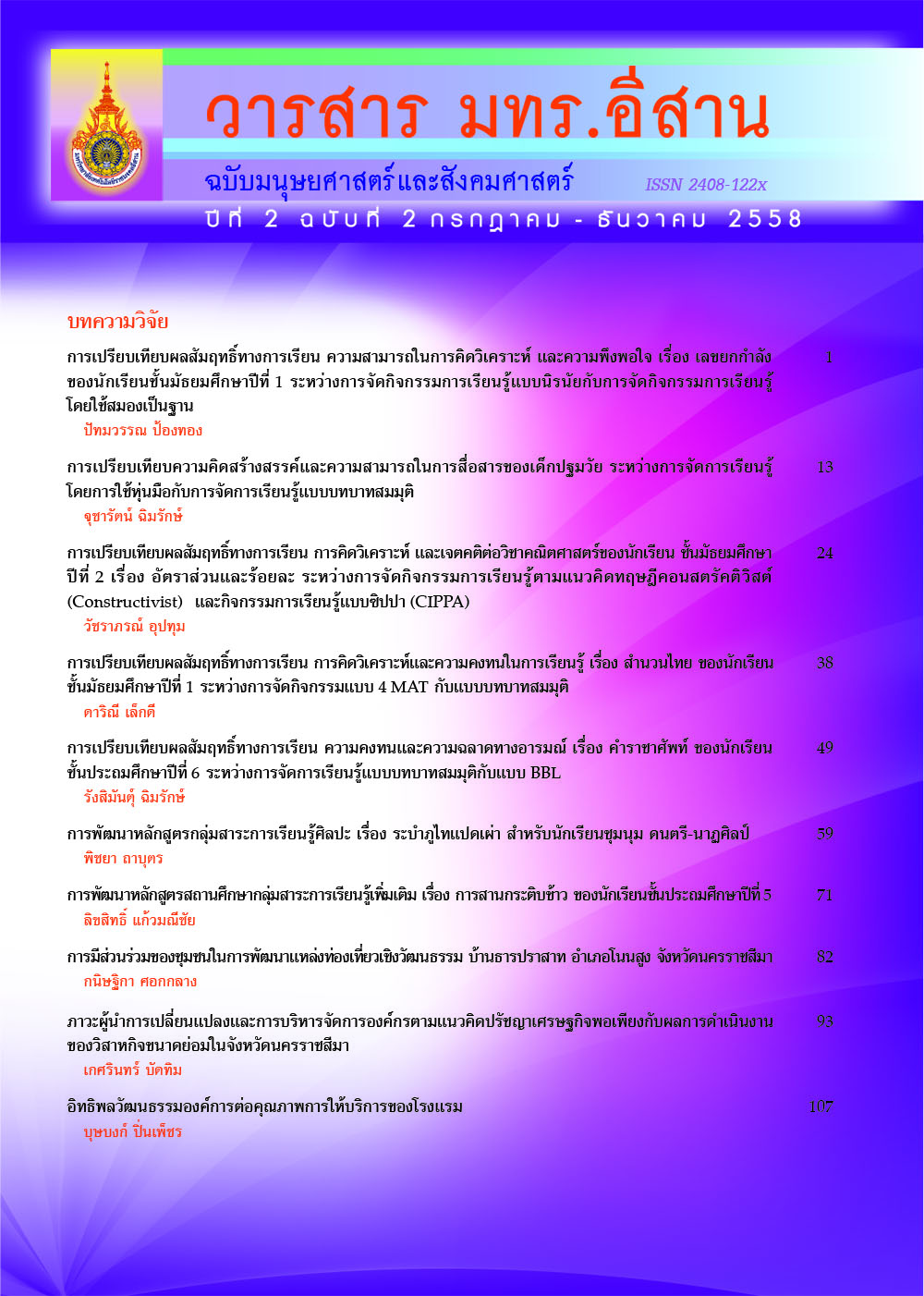Transformational Leadership and Management of the Organization Sufficiency Economy Philosophy with The Operation of Small Enterprises in Nakhonratchasima
Main Article Content
Abstract
The purpose of this research was to study transformational leadership and management of the organization sufficiency economy philosophy with operation of small enterprises in Nakhonratchasima. The samples used were 382 persons core sampling using probability sampling methods precedent and simple. Statistics used to analyze the data were mean, percentage, frequency, standard deviation (S.D.) and multiple regression analysis.
The result of transformational leadership found idealized influence, inspiration motivational, intellectual stimulation and individual consideration, the overall mean at the highest level. Management of the organization sufficiency economy philosophy found moderation, reasonableness, self-immunity, set of knowledge and ethical qualification, the overall mean at the highest level, and the operation of small enterprises in Nakhonratchasima found customer, internal process, learning and growth and financial. The overall mean at the highest level. For hypothesis testing found transformational leadership and management of the organization sufficiency economy philosophy. The affect on the operation of small enterprises in Nakhonratchasima, was that income and sales increased. The associated costs are reasonable. Customer satisfaction with regard to products and services rose by a statistically significant level of 0.05. Future product for customer satisfaction increases could be as high as 75.50 percent.
Article Details
บทความที่ได้รับการตีพิมพ์เป็นลิขสิทธิ์ของมหาวิทยาลัยเทคโนโลยีราชมงคลอีสาน
ข้อความที่ปรากฏในบทความแต่ละเรื่องในวารสารวิชาการเล่มนี้เป็นความคิดเห็นส่วนตัวของผู้เขียนแต่ละท่านไม่เกี่ยวข้องกับมหาวิทยาลัยเทคโนโลยีราชมงคลอีสานและคณาจารย์ท่านอื่นๆในมหาวิทยาลัยฯ แต่อย่างใด ความรับผิดชอบองค์ประกอบทั้งหมดของบทความแต่ละเรื่องเป็นของผู้เขียนแต่ละท่าน หากมีความผิดพลาดใดๆ ผู้เขียนแต่ละท่านจะรับผิดชอบบทความของตนเองแต่ผู้เดียว
References
จรีวรรณ จันทร์คง. (2551). การวิเคราะห์ผลการดำเนินงานตามหลักปรัชญาเศรษฐกิจพอเพียงของสมาชิกกลุ่มหัตถกรรมดอกไม้ใบยางพาราหู่แร่. งานวิจัย. คณะเกษตรศาสตร์ มหาวิทยาลัยเทคโนโลยีราชมงคลศรีวิขัย.
ทิฆัมพร ทวีเดช. (2554). การบริหารจัดการวิสาหกิจขนาดกลางและขนาดย่อมโดยใช้กลักปรัชญาเศรษฐกิจพอเพียงเพื่อการเจริญเติบโตอย่างยั่งยืน. งานวิจัย. สาขาวิชายุทธศาสตร์การพัฒนาโครงการผนึกกำลังการเปิดสอนหลักสูตรปริญญาเอก. มหาวิทยาลัยราชภัฏพระนคร.
ถวัลย์ลักษณ์ ศรีจันทร์ดี. (2554). การประเมินระดับการใช้หลักปรัชญาเศรษฐกิจพอเพียงเพื่อความอยู่รอดในการดำเนินธุรกิจของอุตสาหกรรมท่องเที่ยวในจังหวัดเขียงราย. วิทยานิพนธ์. สาขาวิชาการจัดการการท่องเที่ยวอย่างยั่งยืน. มหาวิทยาลัยราชภัฏเชียงใหม่.
ธนิยพรรธน์ นิธิทรัพยวโรภาส. (2549). ปรัชญาเศรษฐกิจพอเพียง. บางกอกโพสต์.
ประสพโชค มั่งสวัสดิ์. (2550). ปรัชญาเศรษฐกิจพอเพียงกับการบริหารเศรษฐกิจ. ในการประชุมวิชาการระดับชาติของนักเศรษฐศาสตร์ ครั้งที่3 วันที่26 ตุลาคม พ.ศ.2550. กรุงเทพฯ: คณะเศรษฐศาสตร์มหาวิทยาลัยเกษตรศาสตร์
รุ่งนภา ต่ออุดม. (2550). ปัจจัยความสำเร็จของผู้ประกอบการธุรกิจขนาดกลางและขนาดย่อม SMEs ในอุตสาหกรรมเกษตรภาคการค้า ในจังหวัดฉะเชิงเทรา. การศึกษาค้นคว้าอิสระ. บริหารธุรกิจมหาบัณฑิต. มหาวิทยาลัยเทคโนโลยีราชมงคลธัญบุรี
รัตติกรณ์ จงวิศาล. (2553). การศึกษาภาวะผู้นำและทิศทางใหม่ เพื่อการพัฒนาผู้ประกอบการ SMEs. งานวิจัย. คณะสังคมศาสตร์. มหาวิทยาลัยเกษตรศาสตร์
วรรณา ประยุกต์วงศ์. (2549). กฤษฎีเศรษฐศาสตร์ทางเลือกเพื่อการบริหารธุรกิจที่ยั่งยืน. กรุงเทพฯ: พิมพ์สวย
สุขสรรค์ กันตะบุตร. (2550). การศึกษาการประยุกต์ปรัชญาของเศรษฐกิจพอเพียงในภาคธุรกิจ. กรุงเทพฯ : คณะวิทยาการจัดการ มหาวิทยาลัยมหิดล
สำนักงานคณะกรรมการพิเศษเพื่อประสานงานโครงการอันเนื่องมาจากพระราชดำริ. (2550). เศรษฐกิจพอเพียง ปรัชญาชี้ถึงแนวทางการดำรงชีวิต. กรุงเทพฯ : ม.ป.ท.
สำนักงานส่งเสริมวิสาหกิจขนาดกลางและขนาดย่อม (สสว.). (2556). รายงานสถานการณ์วิสาหกิจขนาดกลางเเละขนาดย่อม ประจำปี 2556. เข้าถึงเมื่อ (10 กุมภาพันธ์ 2557). เข้าถึงได้จาก
(http:/ /www.sme.go.th/ Lists/ EditorInput/ DispF,aspx? List-5dca7fb%2Dbf2e%2D464c%2D97e5%2D4403210405706-ID-2095
ไสว บุญมา. (2549). สู่จุดจบ. นนทบุรี : โอ้พระเจ้าพับลิชชิ่ง.
Bass, Bernard M. and Avolio, Bruce. (1998). Transformation Leadership Development. California: Consulting Psychologists Press.
Bass, Bernard M. and Avolio, Bruce. (1994). Improving Organizational Effectiveness Through Transformational Leadership. Thousand Oaks : Sage Publications.
Kaplan, Robert S. and Norton, David P. (1993). Putting the balanced scorecard work, Harvard Business Review. Access (10 February 2014). Availble (www.goodpracticemodel.com)


